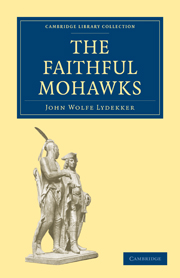Book contents
- Frontmatter
- Contents
- ILLUSTRATIONS
- FOREWORD BY THE RIGHT HONOURABLE LORD TWEEDSMUIR, G.C.M.G., C.H.
- PREFACE
- ABBREVIATIONS
- INTRODUCTION
- Chapter I PRELUDE (1664–1704)
- Chapter II THE FIRST DECADE (1704–1713)
- Chapter III THE NEXT THIRTY-THREE YEARS (1714–1746)
- Chapter IV THE CONFLICT FOR CANADA (i) (1747–1755)
- CHAPTER V THE CONFLICT FOR CANADA (ii) (1756–1760)
- CHAPTER VI THE YEARS BETWEEN (1761–1774)
- CHAPTER VII THE REVOLUTIONARY WAR (1775–1782)
- CHAPTER VIII “THE FAITHFUL MOHAWKS” (1783–1807)
- Appendix
- BIBLIOGRAPHY
- INDEX
- Plate section
FOREWORD BY THE RIGHT HONOURABLE LORD TWEEDSMUIR, G.C.M.G., C.H.
Published online by Cambridge University Press: 07 September 2010
- Frontmatter
- Contents
- ILLUSTRATIONS
- FOREWORD BY THE RIGHT HONOURABLE LORD TWEEDSMUIR, G.C.M.G., C.H.
- PREFACE
- ABBREVIATIONS
- INTRODUCTION
- Chapter I PRELUDE (1664–1704)
- Chapter II THE FIRST DECADE (1704–1713)
- Chapter III THE NEXT THIRTY-THREE YEARS (1714–1746)
- Chapter IV THE CONFLICT FOR CANADA (i) (1747–1755)
- CHAPTER V THE CONFLICT FOR CANADA (ii) (1756–1760)
- CHAPTER VI THE YEARS BETWEEN (1761–1774)
- CHAPTER VII THE REVOLUTIONARY WAR (1775–1782)
- CHAPTER VIII “THE FAITHFUL MOHAWKS” (1783–1807)
- Appendix
- BIBLIOGRAPHY
- INDEX
- Plate section
Summary
I welcome mr lydekker's work as the first-fruits of what I hope will be a continuing harvest, researches among the archives of the Society for the Propagation of the Gospel. The Society was founded by Royal Charter in 1701, and three years later sent out its first missionary to America to work among the Indians. Its archives are therefore important material for the history of the American colonies from that date to the Revolution. They give us, too, a special point of view. The Society's evangelists, like Doty and Stuart, were educated men of high character whose evidence cannot be disregarded.
In history and literature the Iroquois of the Long House are by far the most famous of Indian peoples. Though they never numbered more than three thousand fighting men, they controlled for long the precarious balance of the frontier, and their alliance with the English settlers as against the French was a decisive factor in America's history. Of the five Iroquois nations the Mohawks were the most vigorous stock. They produced not only warriors but statesmen. Their chief figures, like Hendrick and Joseph Brant, fortunately visited England and have their place in the chronicle of English life. You will find Hendrick in the pages of Steele and Addison, and on the canvas of Verelst, while Brant was visited by Boswell, painted by Romney, and given the rank of captain in the British Army. The consequence was that “Mohawk” became as familiar a name in English letters as “Huron” in French.
- Type
- Chapter
- Information
- The Faithful Mohawks , pp. ix - xPublisher: Cambridge University PressPrint publication year: 2010First published in: 1938



